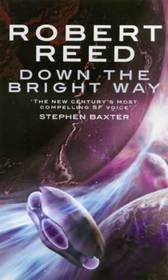Helpful Score: 1
This wasn't bad. In fact it was pretty good.
Aliens have come to Earth! And they're human! But they didn't come from outer space, instead other Earths. And its not the usual SF alternate universe trope of "What if Hitler won? Or the Confederates won the US Civil War?" No, the 'what ifs' of the piece come from biology and deeper historical differences. Some of the humans are close to australopithicines, gigantopithicus, neanderthals and stranger things still. Folks who have read Stephen Baxter's Manifold: Origin might see some familiar elements, but this is predates it and is notably different. They're not here to conquer us, but they're just passing through on their way to find the makers of the trans-universal conduit called the Bright. Because of this, they have a light footprint and won't stay long. It also explains they're name - Wanderers
The gist of the plot is that a human from an Earth not unlike ours manages to impersonate a Wanderer to get a girl. This impersonation leads him on an adventure that places his life and many others at stake. Why? A plot is afoot to destroy the Bright...
The writing is full of details, but even with all that, its still spare. There are tons of ideas there, but Reed tosses them off quickly to get on with the story.
All in all, its a worthwhile read and I strongly recommend it.
Aliens have come to Earth! And they're human! But they didn't come from outer space, instead other Earths. And its not the usual SF alternate universe trope of "What if Hitler won? Or the Confederates won the US Civil War?" No, the 'what ifs' of the piece come from biology and deeper historical differences. Some of the humans are close to australopithicines, gigantopithicus, neanderthals and stranger things still. Folks who have read Stephen Baxter's Manifold: Origin might see some familiar elements, but this is predates it and is notably different. They're not here to conquer us, but they're just passing through on their way to find the makers of the trans-universal conduit called the Bright. Because of this, they have a light footprint and won't stay long. It also explains they're name - Wanderers
The gist of the plot is that a human from an Earth not unlike ours manages to impersonate a Wanderer to get a girl. This impersonation leads him on an adventure that places his life and many others at stake. Why? A plot is afoot to destroy the Bright...
The writing is full of details, but even with all that, its still spare. There are tons of ideas there, but Reed tosses them off quickly to get on with the story.
All in all, its a worthwhile read and I strongly recommend it.
Great Sci-Fi book. Set in a universe where you can travel between similar earths along the "Bright Way", created by a race known as "the Makers"
From back cover: In the vastness of space there are millions of worlds like our own, each with its own version of humanity. At the dawn of time, the godlike Makers created the Bright, a gleaming roadway between the stars, linking all these earthlike worlds. Millions of years later, the Wanderers set out upon the Bright to find the Makers. Drawn from countless worlds, they come to save each planet from self-destructio and unite all of humankind in a common destiny. But far down the Bright wait the unFound, a ruthless, warlike race bent upon conquest. Torn apart by treachery and betrayal, the Wanderers are powerless to stop them.
Now the outcome of all human history rests in the hands of an earth man masquerading as a Wanderer, who must put aside his own selfish goals to avert a shattering catastrophe.
Robert Reed has also written THE LEESHORE, THE HORMONE JUNGLE and BLACK MILK. Reed is also a Grand-prize winner of the Writers of the Future Award, and was a finalist for the John W. Campbell Award for Best New Writer.
Now the outcome of all human history rests in the hands of an earth man masquerading as a Wanderer, who must put aside his own selfish goals to avert a shattering catastrophe.
Robert Reed has also written THE LEESHORE, THE HORMONE JUNGLE and BLACK MILK. Reed is also a Grand-prize winner of the Writers of the Future Award, and was a finalist for the John W. Campbell Award for Best New Writer.




